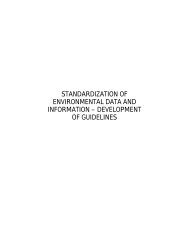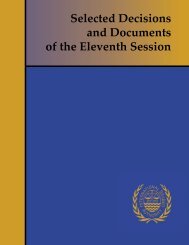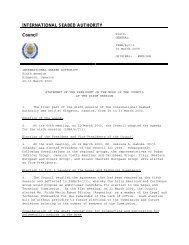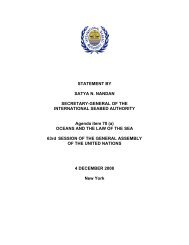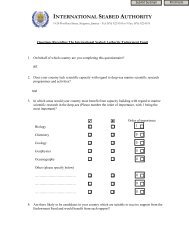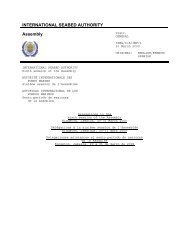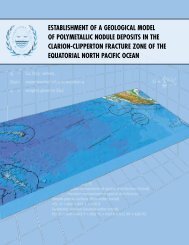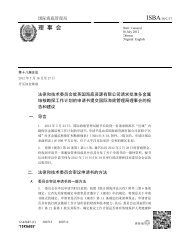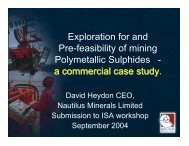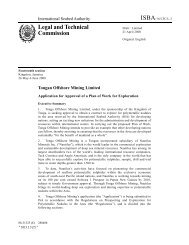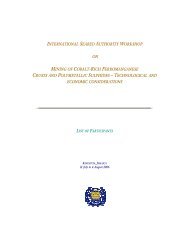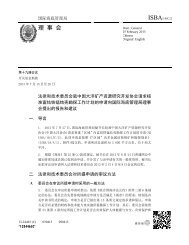Selected Decisions and Documents - International Seabed Authority
Selected Decisions and Documents - International Seabed Authority
Selected Decisions and Documents - International Seabed Authority
Create successful ePaper yourself
Turn your PDF publications into a flip-book with our unique Google optimized e-Paper software.
16. Whichever option for arbitration is chosen, the other issue that arose during the discussions at the<br />
fourteenth session was the question of consistency with Part XI, section 5, of the Convention. Article 188,<br />
paragraph 1, of the Convention provides for the submission of certain categories of disputes to a special<br />
chamber of the <strong>International</strong> Tribunal for the Law of the Sea formed in accordance with articles 15 <strong>and</strong> 17 of<br />
annex VI to the Convention or to an ad hoc chamber of the <strong>Seabed</strong> Disputes Chamber of the Tribunal.<br />
However, the categories of disputes that may be referred in this manner are disputes between States parties<br />
concerning the interpretation or application of Part XI of the Convention <strong>and</strong> relevant annexes, as referred to<br />
in article 187 of the Convention. This would appear to preclude disputes between potential applicants which<br />
do not concern the interpretation or application of Part XI. Article 187(d) provides for the jurisdiction of the<br />
<strong>Seabed</strong> Disputes Chamber in the case of disputes between the <strong>Authority</strong> <strong>and</strong> a prospective contractor, being a<br />
qualified applicant sponsored by a State concerning the refusal of a contract or a legal issue arising in the<br />
negotiation of a contract. Once again, however, this would appear to preclude disputes arising solely between<br />
applicants prior to the stage at which a contract is refused <strong>and</strong> not involving the <strong>Authority</strong>.<br />
17. Article 188, paragraph 2, establishes a procedure for the referral of disputes involving parties to a<br />
contract as described in article 187, subparagraph (c)(i), to binding commercial arbitration. Again, this<br />
procedure would appear to preclude disputes between potential applicants who have not yet been awarded a<br />
contract with the <strong>Authority</strong>. An important point of principle, however, that is specified in article 188,<br />
paragraph 2(a) <strong>and</strong> (b), is that an arbitral tribunal to which a dispute is submitted shall have no jurisdiction to<br />
decide any question of interpretation of the Convention. Any such issue involving a question of interpretation<br />
of Part XI or with respect to activities in the Area shall be referred to the <strong>Seabed</strong> Disputes Chamber for a<br />
ruling <strong>and</strong> the arbitral tribunal shall render its award in conformity with the ruling of the <strong>Seabed</strong> Disputes<br />
Chamber. The Council may consider that this principle, which is also reflected in article 189 of the Convention,<br />
should also be maintained in the draft regulations.<br />
18. Suggested language for a new regulation 23 is set out in annex II to the present document <strong>and</strong><br />
proposed as a basis for continued discussion by the Council.<br />
C. Force majeure (annex 4, section 17)<br />
19. Section 17 of the st<strong>and</strong>ard clauses for exploration contract (ISBA/15/C/WP.1 <strong>and</strong> Corr.1, annex 4)<br />
provides for the possibility of extension of the term of the contract where, for reasons of force majeure, the<br />
contractor is temporarily prevented from its obligations under the contract. Force majeure in this context is<br />
defined as “an event or condition that the contractor could not reasonably be expected to prevent or control;<br />
provided that the event or condition was not caused by negligence or by a failure to observe good mining<br />
industry practice”. In such circumstances, the contract may be extended by a period equal to the period by<br />
which performance was delayed by force majeure.<br />
20. During the discussion of this provision at the fourteenth session, concern was expressed that there<br />
should be a provision whereby a contract may be considered terminated should an event of force majeure<br />
persist for an indefinite period. As this was generally considered to be a technical matter, the Secretariat was<br />
requested to review the relevant provisions <strong>and</strong> propose a suitable draft for further consideration.<br />
21. It is important to observe that while section 17 of annex 4 deals with force majeure, provisions<br />
relating to the suspension <strong>and</strong> termination of contracts are set out in section 21 of annex 4. This section<br />
confers on the Council power to suspend or terminate a contract, by notice to the contractor, on the<br />
occurrence of certain events specified in section 21.1. Importantly, section 21 also sets out the procedural<br />
safeguards for contractors in the event that notice of termination or suspension is given. It is suggested,<br />
therefore, that any provision relating to termination of a contract by reason of a persistent event of force<br />
majeure would be most appropriately located within section 21 rather than section 17 of annex 4. In this way<br />
it would be clear that the same procedural <strong>and</strong> legal safeguards would apply <strong>and</strong> that the decision to<br />
terminate the contract on such grounds would be made only by the Council. This could be accomplished by<br />
42



